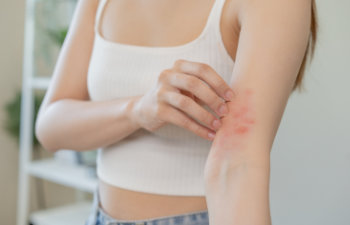
Contact dermatitis is a common skin condition that affects millions of people worldwide. The medical term for contact dermatitis is “eczematous dermatitis.” It occurs when the skin comes into contact with an irritant or allergen, which leads to a rash, redness and itching.
If you have ever experienced a rash after coming into contact with a particular substance such as poison ivy, you may say, “I’ve got poison ivy.” Actually, what you have is contact dermatitis. A substance in the plant irritated your skin, triggering this common skin disorder.
Summer isn’t over yet, and as we still spend time outdoors, the risk for contact dermatitis remains high. Many irritating plants and substances remain active into the fall; many more are found in everyday products we use. Learning all you can about contact dermatitis can help you avoid this irritating and potentially dangerous condition.
The skilled team at Medical Dermatology Specialists in Atlanta can treat contact dermatitis and help you learn how to avoid contracting it in the future. Here, our talented dermatologists discuss everything you need to know about contact dermatitis, including its causes, symptoms and treatment options.
Causes of Contact Dermatitis
There are three types of contact dermatitis: allergic, irritant and photo contact. Each has its own unique characteristics and symptoms.
Allergic Contact Dermatitis
This form of contact dermatitis occurs when the skin comes into contact with a substance that triggers an allergic reaction. Common allergens include nickel, latex and certain fragrances. Symptoms of allergic contact dermatitis may include a rash, blisters and swelling.
Irritant Contact Dermatitis
The second type is irritant contact dermatitis, which occurs when the skin is exposed to a substance that damages or irritates the skin. This can include chemicals, detergents and other harsh substances. Symptoms of irritant contact dermatitis may include redness, itching and dryness of the skin.
Photo Contact Dermatitis
This unique type of contact dermatitis occurs when the skin is exposed to certain substances that become activated by sunlight. Common triggers for photo contact dermatitis include sunscreen, fragrances and certain medications. Symptoms of photo contact dermatitis may include redness, itching and blisters.
Many substances can cause symptoms, and some are more irritating than others. Avoid contact with these substances, especially if you have had previous dermatitis reactions:
- Certain chemicals
- Nickel
- Fragrances
- Soaps
- Detergents
- Skincare preservatives
- Latex
- Rubber
- Poison ivy, oak and sumac
- Other plants
The team at Medical Dermatology Specialists can diagnose contact dermatitis, determine which type you have and recommend the best treatment.
Symptoms of Contact Dermatitis
The symptoms of contact dermatitis can vary depending on the severity of the reaction. All three forms typically produce the same common symptoms, which include:
- Redness and swelling: The affected area may become red and swollen.
- Itching: The skin may feel itchy or irritated.
- Blisters: In severe cases, the skin may develop blisters.
Advanced contact dermatitis can be quite serious, as it can cause severe skin irritation and even lead to infection. It is important to seek medical attention if you are experiencing symptoms of advanced contact dermatitis, such as deep redness that is warm to the touch, itching that is uncontrolled by medication and blistering. Scratching at skin or sores from contact dermatitis raises the risk of infection, which can get into the bloodstream.
Treatment Options
Treatment for contact dermatitis typically involves avoiding the irritant or allergen that caused the reaction and using topical creams or ointments to soothe the skin. In some cases, oral medications may be necessary to relieve symptoms.
Our dermatologists at Medical Dermatology Specialists can prescribe stronger medications if your symptoms persist or worsen. Do not suffer from persistent contact dermatitis symptoms. Contact us today to schedule an exam and consultation.
Prevention
The best way to prevent contact dermatitis is to avoid contact with irritants and allergens. If you are exposed to a substance that may cause a reaction, washing your skin with soap and water is essential as soon as possible.
Contact dermatitis is a common skin condition that various substances can cause. If you experience contact dermatitis symptoms, seeking treatment to relieve discomfort and prevent further complications is essential. Many effective over-the-counter medicines are available at local drug stores, but if your discomfort persists, contact Medical Dermatology Specialists for more advanced treatment.
Posted on behalf of
5730 Glenridge Drive, Suite T-100
Atlanta, GA 30328
Phone: Call (404) 939-9220
FAX: (470) 312-2157
Email: jstalls@atlmedderm.com


